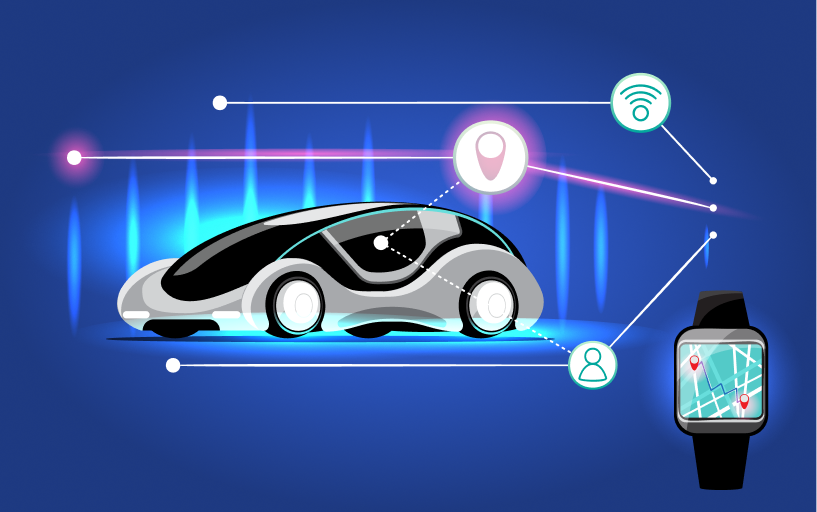Revolutionizing the Automotive Industry: The Power of IoT
Author: Sailusha G Posted On: May 15, 2024
In the age of digital transformation, the Internet of Things (IoT) has emerged as a game-changer across various sectors, and the automotive industry is no exception. The Automotive IoT with its ability to connect vehicles, systems, and infrastructure to the internet, is reshaping the way we perceive transportation, driving innovation, efficiency, and safety to unprecedented levels. In this blog post, we delve into what IoT is, its applications in the automotive industry, and the myriad benefits it offers.

Understanding IoT
The Internet of Things (IoT) refers to a network of interconnected devices, objects, or systems that are embedded with sensors, software, and other technologies to collect and exchange data over the internet. These devices can range from everyday objects such as smartphones, wearable devices, and home appliances to complex industrial machines and infrastructure.
The primary goal of IoT is to enable these devices to communicate with each other, share data, and perform tasks autonomously or with minimal human intervention. This interconnectedness allows for the creation of smart environments where devices can monitor, analyze, and respond to changes in their surroundings in real-time.
IoT in the Automotive Industry
1. Vehicle Connectivity
IoT in the Automotive Industry facilitates uninterrupted connectivity among vehicles, infrastructure, and diverse devices, thereby fostering the emergence of smart cars. These automobiles have the capability to engage in communication with each other, as well as with traffic signals and centralized systems. This connectivity serves to streamline traffic flow, preempt accidents, and augment navigation systems, thereby enhancing overall road safety and efficiency.
2. Predictive Maintenance
Within the automotive sector, IoT boasts a pivotal application known as predictive maintenance, marking a significant advancement in vehicle upkeep practices. Through the integration of sensors within vehicles, manufacturers gain the ability to closely monitor crucial components like engine health, tire pressure, and brake wear in real-time.
This proactive approach enables them to anticipate potential issues well before they reach critical levels, thus effectively minimizing downtime and curtailing maintenance expenses. By leveraging IoT-powered predictive maintenance, automotive enterprises can ensure optimal operational efficiency while simultaneously enhancing the longevity and reliability of their vehicles.
3. Enhanced Safety
IoT assumes a crucial role in bolstering road safety by incorporating advanced functionalities such as collision avoidance systems, lane departure warnings, and adaptive cruise control. Leveraging real-time data collected from sensors and cameras, these systems adeptly identify potential hazards, promptly alert drivers, and can even autonomously initiate corrective measures. Consequently, the integration of IoT technologies significantly reduces the likelihood of accidents, thereby enhancing overall road safety.
4. Fleet Management
For enterprises managing a fleet of vehicles, IoT presents a treasure trove of indispensable tools for optimizing operations. Through real-time vehicle tracking, meticulous monitoring of fuel consumption, and route optimization capabilities, businesses can orchestrate their fleet management with unprecedented efficiency. This multifaceted approach enables companies to streamline logistical operations, curtail fuel expenditures, and ultimately bolster overall productivity. By harnessing the power of IoT, organizations can navigate the complexities of fleet management with finesse, ensuring enhanced cost-effectiveness and operational excellence.
5. Personalized Driving Experience
The integration of IoT in the Automotive Industry empowers car manufacturers with the capability to finely craft the driving experience to align seamlessly with individual preferences. This customization extends across various facets of the vehicle, including personalized infotainment systems, climate control settings, and driver assistance programs. By harnessing the wealth of data derived from analyzing driving habits, personal preferences, and prevailing environmental conditions, vehicles are poised to dynamically adjust and cater to the unique needs of each driver. This adaptive approach not only elevates comfort and convenience but also ensures a truly tailored driving experience that resonates with the individuality of every driver, ushering in a new era of automotive personalization and customer satisfaction.
Benefits of IoT in the Automotive Industry
1. Improved Efficiency
By optimizing processes, reducing downtime, and minimizing fuel consumption, IoT enhances the overall efficiency of automotive operations, leading to cost savings and increased productivity.
2. Enhanced Safety and Security
IoT-powered safety features help prevent accidents and mitigate risks on the road, while advanced security systems protect vehicles from theft and unauthorized access, ensuring peace of mind for drivers and owners alike.
3. Better Customer Experience
With personalized services and seamless connectivity, IoT transforms the driving experience, making it more enjoyable, convenient, and tailored to individual preferences.
4. Data-Driven Insights
By collecting and analyzing vast amounts of data, IoT provides valuable insights into vehicle performance, driver behavior, and market trends, enabling manufacturers to make informed decisions and drive innovation.
5. Environmental Sustainability
Through features like eco-driving assistance and electric vehicle optimization, IoT contributes to reducing emissions and promoting sustainability in the automotive industry, aligning with global efforts to combat climate change.
In summary, the Internet of Things stands as a catalyst for revolutionary change within the automotive sector, propelling innovation, efficiency, and safety to unprecedented levels. With its diverse range of applications and inherent advantages, IoT is on the brink of reshaping our understanding of transportation, heralding the arrival of a transformative era characterized by smart, interconnected, and sustainable mobility solutions.
As technological advancements continue to unfold, the potential for IoT in the automotive realm knows no bounds, promising a future where driving transcends its traditional role as mere transportation and evolves into a personalized experience tailored to the unique needs and preferences of each individual. In this dynamic landscape, the fusion of IoT and automotive technology holds the promise of a safer, more efficient, and truly immersive driving experience for all.
We are here to build IoT for your requirements. Click here in to get in touch with us
Recent Articles



